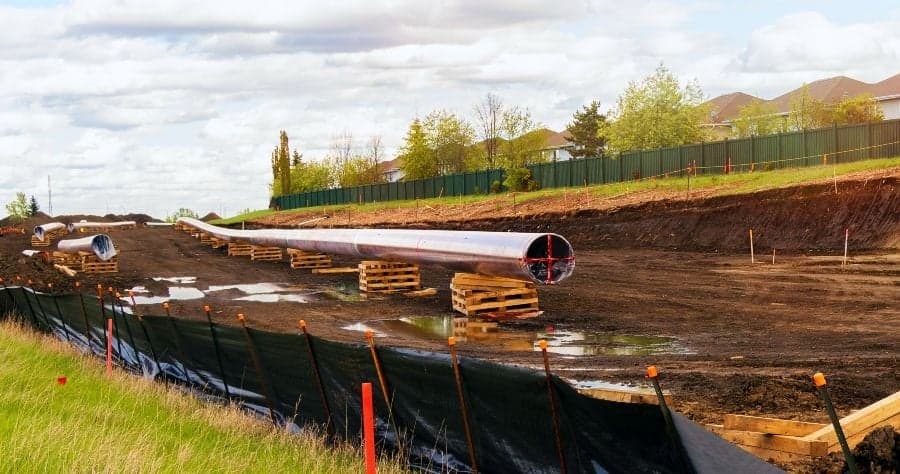Amid an economic downturn, the small town of Oyen, AB has seen a boost. In the early days of fall, downtown Oyen can be seen filled with workers buying groceries, stopping by the local pub, or picking up take out after work.
These men are only a fraction of the recently-arrived workers, who have nearly doubled the town’s population to around 2,000.
Over the past several months, Oyen and other small towns in the area have had a taste of what some Albertans regard as the good old days.
Approximately 850 workers, including excavator operators, sideboom operators, grader operators, truck drivers, labourers, welders, pipefitters and safety, have come to the area to work on the canadian leg of the Keystone XL Pipeline. By the end of October, there will be close to 1,000 workers in the area.
"It has been a tremendous boost for this community to have workers," said economic development officer Wanda Diakow, "It's been a tremendous boost for our region."
With Alberta’s unemployment rate pushing 12%, the provincial economy could use a boost. The mini-boost seen in Oyen is supported by government investment.
The province is taking a gamble with construction on Keystone XL, given its uncertain future in the United States. Presidential nominee Joe Biden has said he will kill the pipeline if he wins the election.
Keystone XL remains a controversial project, facing legal battles, environmental protests, and contempt from celebrities.
The pipeline aims to be in service by 2023 at the earliest, meaning that the boom won’t last forever. With that in mind, workers and businesses alike are making the most out of the opportunity.
Workers have filled hotel rooms, RV parks, and rental suites. Crews have already raised over $15,000 for the local food bank and other support programs. The company even invested over $200,000 to improve waterlines and roadways in Oyen.
Once in service, the pipeline is expected to bring in over $4 million annually in property taxes for municipalities along the Alberta right of way. Some work will continue along
Located 300 km east of Calgary, near the Saskatchewan border, Oyen is no stranger to the oil patch. Pipeliners from the past decade came to town when working on the original Keystone pipeline. When the industry took a downturn six years ago, Oyen felt the sting too.
After years of political and legal obstacles, the town was uncertain of when, or even if, they would have the opportunity to host pipeliners for the Keystone XL project. The 1,947 km pipeline would transport oil from Hardisty, AB to Steele City, Nebraska, and then on to refineries along the Gulf Coast.
Workers started arriving over the summer to work of the 269km Alberta leg of the pipeline after the Alberta government announced their $1.1 billion US equity investment and guarantee of a $4.2 billion project loan in order to get things moving.
Oyen has seen big boosts to business as well as the rental market. Rental properties in town are in great demand, with some residents choosing to open up their homes to workers. Diakow estimates that rentals are injecting approximately $75,000 each month into the regional economy, not including hotels.
Local resident Kari Kuzmiski has rented a home to one worker.
"Lots of people are renting out bedrooms in their homes that never would do that," Kuzmiski said. "It's helping both, right? Helping [homeowners] with bills, yet helping Keystone out, too."
Local pub manager Charlene Carlson has been a longtime resident of Oyen, raising her two children in the town. She claims that the pipeline has brought a morale boost along with the financial lift.
"That's the big thing with being proud to live here," she said. "You come from a province that these people are so hardworking [and that] people come here to do that type of work."
Doug Dingman has lived through the ups and downs of the oilpatch. He was among the thousands of Albertans who lost their oilpatch jobs years ago after teh collapse of global crude prices.
He now owns the T&D Fresh Foods off of Main Street. He says business is up as much as 7% from last year. Despite his past hardships, Dingman remains a strong supporter of Alberta's energy sector.
"I understand the changeover to new energies and stuff — eventually we have to go that route," said Dingman. "But, for now, new energies are further out than they want it to be. So I think we still have to use fossil fuels until the proper changeovers are made."
For Alberta’s oil industry, the final fate of the Keystone XL Pipeline remains unknown. While there is an economic boost from the project now, many eyes are on Washington, DC and the US presidential election to see what happens next.
Donald Trump supports the project but rival Biden has said he will cancel the Keystone XL pipeline permit if he wins. Whether he’ll see through that promise remains to be seen. It’s a common conversation topic among workers and locals alike.
Carlson says that the discussion has come up in her own home, and that she remains a realist.
"I get that the world is changing, and we all have to adapt to that," Carlson said. "The world now is a world that's being built for my kids — and not so much us [older generations]. So we all have to change a little bit. But I hope it's for the better. I hope we're all successful."

